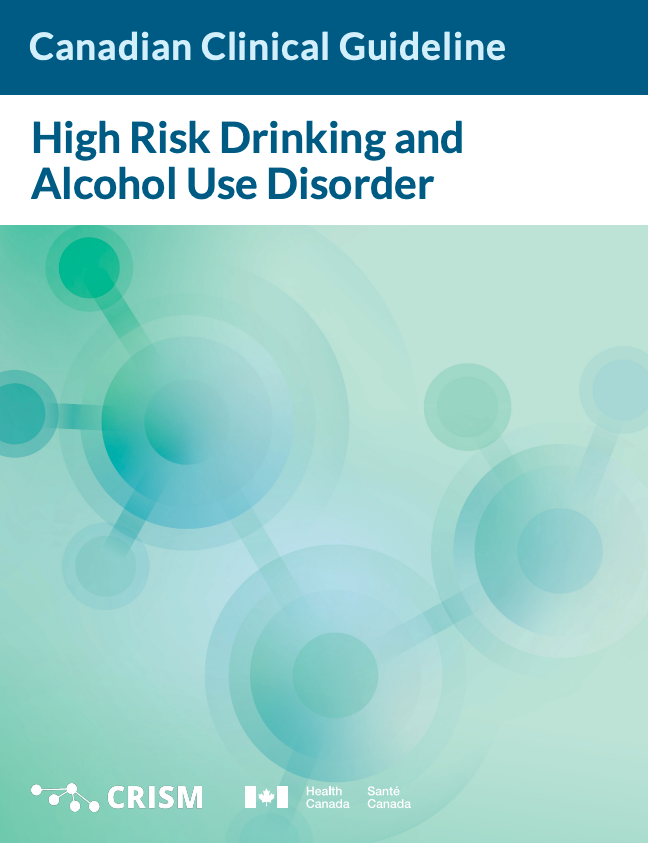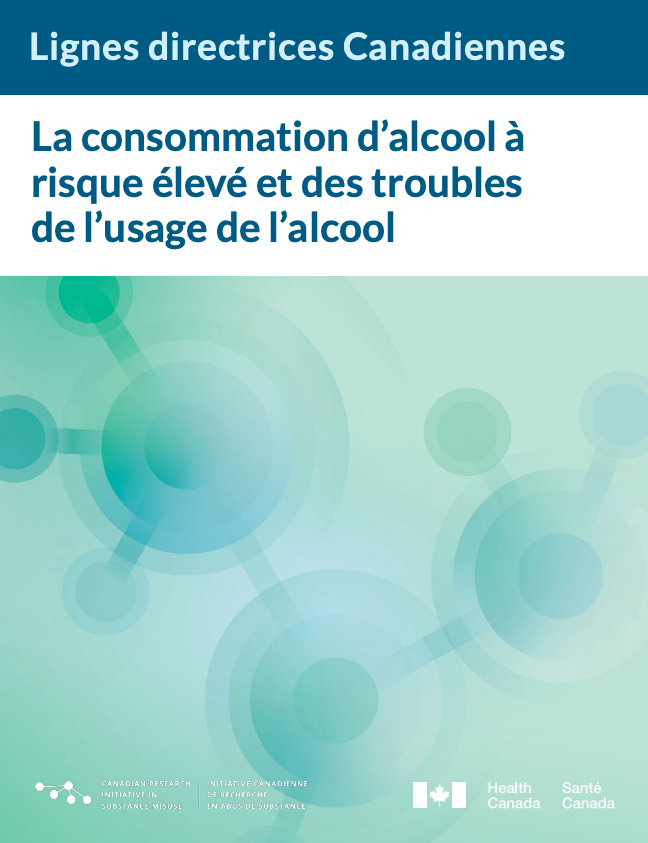Canadian Alcohol Use Disorder Guideline
October 2023
Clinical Guidelines
Physicians, nurses and nurse practitioners, pharmacists, regulated health care professionals, and all other clinical and non-clinical personnel with and without specialized training in addiction medicine, who are involved in the care and management of individuals, families, and communities affected by alcohol use, high-risk drinking, and alcohol use disorder.

The first-ever Canadian guideline for treating high-risk drinking and alcohol use disorder was published in October 2023.
Developed in partnership between the Canadian Research Initiative on Substance Matters (CRISM) and BC Centre on Substance Use (BCCSU), the guideline provides 15 evidence-based recommendations to reduce harms associated with high-risk drinking and to support people’s treatment and recovery from alcohol use disorder.
The guideline provides recommendations for the clinical management of high-risk drinking and alcohol use disorder to support primary healthcare providers to implement evidence-based screening and treatment interventions.
Developed by a 36-member committee, the guideline is based on the latest evidence, expert consensus, lived/living experience as well as clinical experience from across Canada. It makes recommendations for care providers about how to ask about alcohol, diagnose alcohol use disorder, manage alcohol withdrawal, and create treatment plans based on the individual’s goals.
Screening, Diagnosis, and Brief Intervention
RECOMMENDATION 1: When appropriate, clinicians should inquire about current knowledge of and offer education to adult and youth patients about Canada’s Guidance on Alcohol and Health, in order to facilitate conversations about alcohol use. (LOW, STRONG)
RECOMMENDATION 2: All adult and youth patients should be screened routinely for alcohol use above low risk. (MODERATE, STRONG)
RECOMMENDATION 3: All adult and youth patients who screen positive for high-risk alcohol use should undergo a diagnostic interview for AUD using the DSM-5 criteria and further assessment to inform a treatment plan if indicated. (LOW, STRONG)
RECOMMENDATION 4: All patients who screen positive for high-risk alcohol use should be offered brief intervention. (MODERATE, STRONG)
Withdrawal Management
RECOMMENDATION 5: Clinicians should use clinical parameters, such as past seizures or past delirium tremens, and the Prediction of Alcohol Withdrawal Severity Scale (PAWSS) to assess the risk of severe alcohol withdrawal complications and determine an appropriate withdrawal management pathway. (MODERATE, STRONG)
RECOMMENDATION 6: For patients at low risk of severe complications of alcohol withdrawal (e.g., PAWSS < 4), clinicians should consider offering non-benzodiazepine medications, such as gabapentin, carbamazepine or clonidine for withdrawal management in an outpatient setting (e.g., primary care, virtual). (gabapentin: MODERATE, STRONG; carbamazepine, clonidine: LOW, STRONG)
RECOMMENDATION 7: For patients at high risk of severe complications of withdrawal (e.g., PAWSS ≥ 4), clinicians should offer a short-term benzodiazepine prescription, ideally in an inpatient setting (i.e., withdrawal management facility or hospital). However, where barriers to inpatient admission exist, benzodiazepine medications can be offered in outpatient settings if patients can be closely monitored. (HIGH, STRONG)
RECOMMENDATION 8: All patients who complete withdrawal management should be offered ongoing AUD care. (LOW, STRONG)
Ongoing Care – Psychosocial Treatment Interventions
RECOMMENDATION 9: Adults and youth with mild to severe AUD should be offered information about and referrals to specialist-led psychosocial treatment interventions in the community. (MODERATE, STRONG)
Ongoing Care – Pharmacotherapy
RECOMMENDATION 10: Adult patients with moderate to severe AUD should be offered naltrexone or acamprosate as a first-line pharmacotherapy to support achievement of patient-identified treatment goals.
- Naltrexone is recommended for patients who have a treatment goal of either abstinence or a reduction in alcohol consumption.
- Acamprosate is recommended for patients who have a treatment goal of abstinence. (HIGH, STRONG)
RECOMMENDATION 11: Adult patients with moderate to severe AUD who do not benefit from, have contraindications to, or express a preference for an alternative to first-line medications can be offered topiramate or gabapentin. (Topiramate: MODERATE, STRONG; Gabapentin: LOW, CONDITIONAL)
RECOMMENDATION 12: Adult and youth patients should not be prescribed antipsychotics or SSRI antidepressants for the treatment of AUD. (MODERATE, STRONG)
RECOMMENDATION 13: Prescribing SSRI antidepressants is not recommended for adult and youth patients with AUD and a concurrent anxiety or depressive disorder. (MODERATE, STRONG)
RECOMMENDATION 14: Benzodiazepines should not be prescribed as ongoing treatment for AUD. (HIGH, STRONG)
Community-Based Supports and Programs
RECOMMENDATION 15: Adults and youth with mild to severe AUD should be offered information about and referrals to peer-support groups and other recovery-oriented services in the community. (MODERATE, STRONG)


